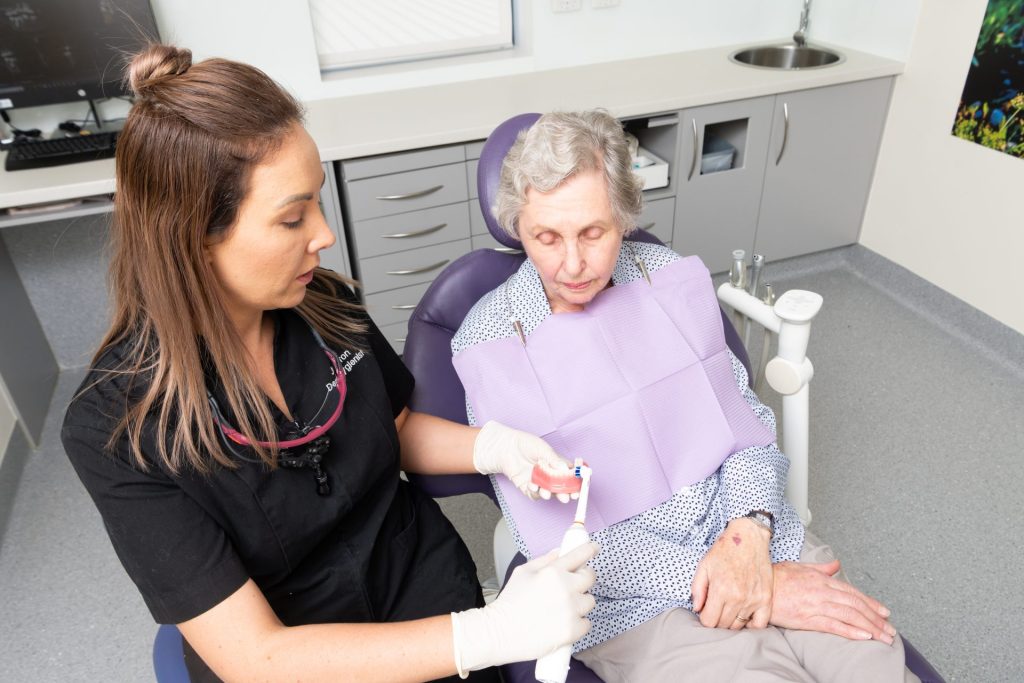
Healthy gums for healthy teeth
There’s more to oral hygiene than having a sparkling white smile. What’s often overlooked is gum health. Your gums play a key role in keeping your teeth healthy and in place. The tissue surrounding the base of your teeth on your upper and lower jaw are your gums, also known as gingiva (if you’re feeling scientific).
If you don’t treat your gums right, you might experience gingivitis or periodontitis. These varying levels of gum disease are some of the leading causes of tooth loss among adults. Fortunately, regular visits to our Castle Hill dental practice combined with healthy oral hygiene habits at home, like flossing and brushing, can help you maintain your gum health.
If you’re stressing about the potential condition of your gums, don’t worry! We can’t emphasise enough that it’s never too late to begin caring for them the way you should. Gum disease can be very treatable, especially in its early stages. So, if your gums are showing you warning signs or you’re just feeling unsure, come visit our expert dental team at The Village Dentist. Our dentists and dental hygienists are here to help you improve your oral health through professional gum disease treatment.
What is gum disease?
Gum disease typically comes in two stages, which are gingivitis and periodontitis. A build-up of plaque and tartar is often the most common causes of gingivitis, which is the first stage of gum disease. It’s a relatively common infection affecting close to 3 in 10 Australians. Below, you can find some more details on gingivitis and periodontitis:
Gingivitis
This is the first stage of gum disease where a build-up of plaque and tartar inflames the gums. If you have gingivitis, you might notice your gums are red, swollen and tender. Mild bleeding while you’re brushing your teeth, along with bad breath, can be indicators of gingivitis. At this stage, it’s often very treatable, but time is of the essence.
Periodontitis
If you leave your gingivitis to its own devices, it might develop into periodontitis, which is a more advanced gum disease than gingivitis. Periodontitis can cause more serious dental issues, such as jaw deterioration, gum pockets, receding gum lines and even tooth loss. If you’re suffering from periodontitis, our experienced dental hygienists can perform periodontal therapy to help remedy the infection and discomfort caused by periodontitis.
Gum disease and general health
Studies have shown that there’s a correlation between periodontal disease and general health. It’s been shown that there’s a higher incidence of people with gum disease having heart disease and the same bacteria found in gum disease are also found in artery blockages in the heart!
Also, an infection of the gums (albeit not a painful one) affects the insulin control of diabetics, which affects healing and all other problems with uncontrolled diabetes. These are just two examples, but after all, the mouth is the gateway to the body. So, keeping it healthy is a great way to improve your quality of life and keep your body healthy.
Tips for preventing gum disease
It might comfort you to know that there are plenty of steps you can take to prevent gingivitis and, subsequently, periodontitis. Most of these steps you can conduct at home and they all contribute to your overall dental health too.
1. Maintain excellent oral hygiene habits
The most effective and simple method for preventing gum disease starts at home with excellent oral health habits. The primary causes of gingivitis are a build-up of plaque and tartar, which you can avoid through regular and diligent brushing and flossing or other interproximal cleaning aides. You can also use anti-bacterial mouthwash to add that extra preventative measure.
2. Be on the lookout for symptoms
Awareness of your gum health is another helpful step to consider. Every time you brush your teeth, check your gums for the common signs of gingivitis and periodontitis. These signs can include bleeding while brushing teeth, receding gums, loose teeth, changes in teeth alignment, persistent bad breath and red or swollen gums.
3. Visit your dentist
While it’s important to monitor your gum health, there‘s a possibility to have gum disease while experiencing no symptoms. For this reason, it’s an excellent idea to visit a dental practice and have regular checkups. Our dental team at Castle Hill comprises experts in dental care and identifying ailments that may cause you discomfort or pain. If you’re experiencing dental pain, inflamed gums and other symptoms, our team of dentists can perform a range of dental treatments, including periodontal therapy. This therapy focuses on patients with moderate to advanced stages of periodontitis and involves scaling and root planing.
4. Practice general healthy habits
A balanced and healthy lifestyle can work wonders for your body’s health, including your oral health. Your diet and hydration are some of the key lifestyle aspects to balance. You don’t have to cut out starchy and sugary foods completely, but it’s best to consume them in moderation. Starchy and sugary foods might contribute to receding gums by accelerating the tooth decay process. Staying hydrated is also another excellent way to maintain healthy teeth and gums. If you stay hydrated, you produce saliva that helps rid bacteria from your mouth.
5. Stress less
It’s completely normal for dental problems to cause you stress. Stressing about your teeth, though, can cause an unhealthy cycle. One of the major causes of stress from dental care is the feeling that it’s too late to start dental treatments. The truth is that it’s never too late! Here, at our Castle Hill dentist rooms, we offer a wide range of dental services to help you solve the dental problems you may face, no matter your age. Most importantly, we’re here to help and work with you in a judgement-free environment.
